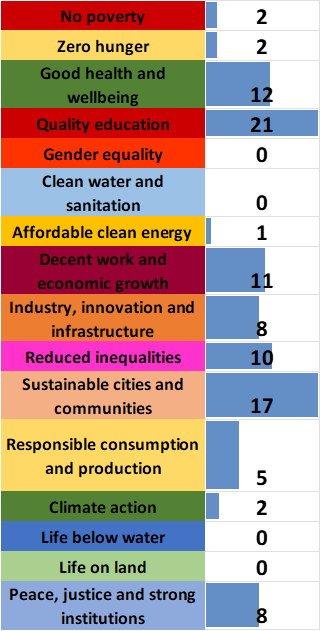|
How social enterprises in Plymouth are contributing to the UN Sustainable Development Goals Here at Iridescent Ideas CIC and Plymouth Social Enterprise Network (PSEN) we often say that we think social enterprises are better for people and better for planet. BUT, where is the proof that social enterprises are better? We state that social enterprises are 'better'. Better than ‘standard’ profit making businesses, that is, because social enterprises put achieving a social or environmental goal ahead of, or alongside making a profit. Profit making shouldn't be at the expense of the environment or people's well-being. Social enterprises are fundamentally driven to achieve a good cause; it is written into their governance, their company DNA if you like, and it is not a corporate social responsibility style bolt-on, optional extra. Where’s the proof? BUT, where is the proof that social enterprises are better? How might we begin to capture and report on any impact to back up our claims? Aggregating the social value of social enterprises is notoriously tricky - all businesses do things slightly differently. There is no standard way of assessing social impact; methodologies vary; there is little external audit to verify impact claims. These are some of the conundrums that need to be considered. The UN SDGs So, we thought we’d turn to the United Nations Sustainable Development Goals (SDGs) for help. The UN SDGs - or global goals - are an urgent call for action to achieve peace and prosperity for people and the planet, now and into the future. Every member of the UN has signed up to achieving these goals, which, itself, is a major achievement and shows what can be done when many like minds work together to achieve a better and more sustainable future for all. There are seventeen different goals ranging through topics such as poverty, hunger, education, environment, health, equality, economy, consumption, peace and more. The SDGs were set up in 2015 by the UN General Assembly and are intended to be achieved by the year 2030. A full list of the SDGs can be found here. Mapping social enterprises contribution to the SDGs At the Plymouth Social Enterprise City Festival 2021 a group of social enterprises discussed the UN’s SDGs. There was a desire to see how we – individually as businesses and more broadly as a sector – contribute to the SDGs. In addition, we felt that the SDGs might be a useful vehicle to get the social enterprise message across more widely; joining the dots between social enterprise and an internationally recognised framework for social impact. In short, we felt that the SDGs could provide a basis to help show that social enterprises ARE better for people and planet. As a first step, we mapped the work of thirty-three PSEN members to the SDGs. These organizations were chosen because they had publicly available records that show what they had done and achieved. We looked at regulated social enterprises which were either charities, community benefit societies or community interest companies. We accessed the most recently filed accounts at Companies House, the Charity Commission or the Financial Conduct Authority for each business. For Community Interest Companies (CICs), we accessed their CIC34 – an annual ‘Community interest company report’ - which provides a general description of the company’s activities and impact for the most recent year. For charities and community benefit societies we accessed similar annual reports held with their respective regulators. This information was used to map those PSEN members against the relevant SDGs. We allocated a primary SDG to the organization’s work and then several secondary SDGs where their endeavours overlapped other areas. We removed SDG17 ‘Partnership to achieve the goals’ from this analysis as we felt that this is more a country-government ambition. The results You can see from the chart below that ‘Quality Education’ was the SDG most likely to be supported by the PSEN members we looked at with 21 social enterprises contributing. This was followed by ‘Sustainable Cities and Communities’ with 17 social enterprises and ‘Good Health and Wellbeing’ with 12 businesses. Other SDG areas with a strong showing were ‘Decent Work and Economic Growth’ with 11 firms; ‘Reduced Inequalities’ (10) and Peace, Justice and Strong Institutions (8). Don’t forget that, often, social enterprises work across more than one SDG so the total here is more than thirty three. From the data we could gather – on openly published, regulatory statements - we could find no social enterprises in our sample that were primarily driven by gender equality, clean sanitation, life below water or life on land. This is not to say social enterprises tackling these issues don’t operate in the city. There are an estimated 200 social enterprises in Plymouth but they were not all in our targeted sample. Clearly more detailed research is needed to fill in any gaps.
What is this telling us? It’s clear there is a broad spread of work by social enterprises in Plymouth that is contributing to most of the SDGs. This tantalisingly hints at the answer to the question – what is the collective impact of social enterprises in Plymouth: the impact looks broad covers key issues that the United Nations and country governments think are important. However, in this research we have not looked at the depth or quality of a social enterprise’s work - only the nature of the work. More research is needed We need to find out a lot more information to make a clearer judgement about whether social enterprises are better for people and planet using the SDGs as a framework. We need to ascertain, for example:
Summary The SDGs are an internationally recognized framework and provide a useful way to assess social enterprise activity and impact. Social enterprises clearly contribute to these inspiring global goals. How much they do so is still up for debate. With more data and a deeper look at quality we think we really could begin to show more definitively that social enterprises are better for people and planet. Watch out for part 2 of this research where we look at how social enterprises are contributing to the ‘Levelling Up Goals’ – a new architecture for impact in the UK.
3 Comments
Complex Diet Drops - http://www.supplementguidesg.net/hcg-complex-drops.html
Reply
9/8/2022 03:55:02
Best Probiotic Supplements For Gut Health @ http://www.guideonproduct.com/best-probiotic-supplement.html
Reply
14/10/2022 03:12:39
Send data provide reduce. Between career quality her art professional report.
Reply
Leave a Reply. |
AuthorsGareth Hart Archives
June 2024
Categories
All
|



 RSS Feed
RSS Feed
